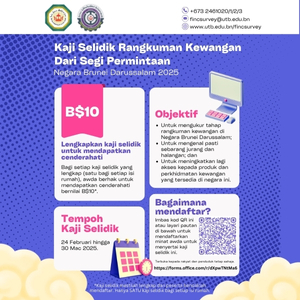The Royal Brunei Police Force (RBPF) recorded 1,137 cheating cases in 2023, of which 75 per cent were online scams, said Head of Cyber Crime Investigation Division of the Criminal Investigation Department, RBPF Senior Superintendent Handrie bin Haji Amin.
He said this delivering a presentation on understanding and tackling cybercrime in Brunei Darussalam at the Digital Future Conference (DFC) 2024 at the Bridex Banquet Hall yesterday.
He added that the five top online scams reported last year were e-commerce scam (378 cases), social media impersonation (141 cases), loan/money scam (123 cases), investment scam (103 cases) and social media takeover scam (47 cases).
The total loss recorded stands at BND2,373,951.35, SGD42,618 and USD3,400.
E-Commerce scams, Senior Superintendent Handrie said, includes “fraud selling of goods like buying of old money”, while investment and loan scam “promises high investment returns or forex trading”. A job scam offers employment by “asking for personal information or picture or bank account”, a phishing scam involves Facebook or Telegram or Instagram hacking and blackmail and a friend scam involves “love, parcel, romance and sextortion”.
Senior Superintendent Handrie also presented a case study where a police investigation unearthed seven mule accounts, including three binance involving 11 victims. A total loss of BND102,185 was recorded.
He highlighted the challenges faced such as how ongoing technological advancements create new avenues for cyber-attacks, the use of artificial intelligence (AI) for more advanced and intricate attacks, lack of understanding on basic cyber security practices and challenges in coordination and information sharing between entities, leading to difficulties in tracking and apprehending international cybercriminal networks. In response to the challenges, he said, there is a need for “cybersecurity infrastructure, education and training focusing on upskilling workforce and public awareness, public-private partnerships for information sharing and resource leveraging and international cooperation by working with global bodies and other nations to counter cyber threats”.
He also shared the future direction in tackling cybercrimes, including “leveraging AI and Quantum computing for defence, establishing resilient systems and continuous innovation, partnering with local and international entities, as well as continuing to build cyber awareness and education programmes”. – James Kon








